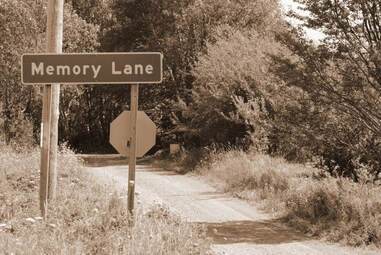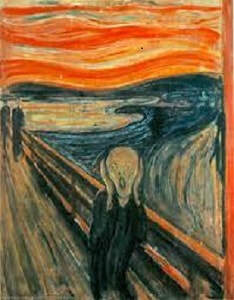David Tickner's Blog, page 12
July 25, 2023
Lawn
 Did you ever watch that series of gardening shows on TV called Lawn Order?
Did you ever watch that series of gardening shows on TV called Lawn Order?Are you surprised to learn that the word lawn comes from ancient words meaning land?
The word lawn has its origins in Proto-Indo-European (PIE) lendh (land, open land, heath) and Proto-Germanic landja. In Old Norse, Old Frisian Dutch, Gothic, German, and Old English the word land meant land, ground, soil. In Old English, land also referred to the home region of a person or people, a territory marked by political boundaries.
The word lawn (turf, stretch of grass) appears in English in the 1540s from laune (an open space in a forest or between woods) and early 14th century Middle English launde and Old French lande (heath, moor, barren land, clearing), all from Proto-Germanic and PIE sources.
On a side note, in ancient times, people who lived on the heath or the grasslands of the countryside were known as heathens. Heathens were rural folks (country bumpkins) not to be confused with the sophisticated city folks who knew the proper ways to think about things.
Anyway, to make a lawn story short, the word lawn meaning grassy ground to be kept mowed is from 1733.
Image: https://commons.wikimedia.org/wiki/File:Butlocks_Heath_-_geograph.org.uk_-_147887.jpg
Reference: Online Etymological Dictionary, https://www.etymonline.com/
Published on July 25, 2023 20:03
July 20, 2023
Pink
 Did you know that back in the day pink was the boy colour and blue was the girl color?
Did you know that back in the day pink was the boy colour and blue was the girl color?No one knows for certain of the origin of the name for the color pink. On the other hand, while the origins of the verb ‘to pink’ are also uncertain, one source suggests that this verb comes from Proto-Indo-European (PIE) peuk (to prick), Latin pungere and Old English pyngan, both meaning to prick or to pierce.
By around 1200 the word pungde (to pierce, puncture, stab with a pointed weapon) appears in English and by the early 14th century the word also meant to make holes in or to spur a horse. Around 1500, to pink meant to decorate a garment or leather by making small holes in a regular pattern. This is the source of the term ‘pinking shears’.
In the 1570s, pink was the name of a garden plant of various colors which had perforated or scalloped petals. The Dutch word pink means small or narrow (like your pinkie finger).
What does all this have to do with the color pink? Not much. As mentioned, no one knows for certain the origins of the name of the color pink.
One suggestion for the origin of the color pink is the 14th century English word incarnation (flesh-colored, blood-colored); hence the pink flower now called a carnation. This 14th century word suggests that pink has associations with blood and blessings and power. But let that be another story.
By the 1590s, the term pink was used to describe the excellence of something; e.g., “She was in the pink of health” or “He was tickled pink.”
The term ‘pink-colored’, from the 1680s, refers to a common color of flowers. The noun pink referring to pale red color is first seen in 1733.
In the late 19th century, baby clothes for boys were pink and clothes for girls were blue. Pink, as a version of red, was perceived as a stronger color than blue; e.g., the red-coated uniforms of British solders at that time. In contrast, for centuries the color blue had traditionally been associated with the Virgin Mary.
However, in the 1950s something happened. Pink became associated with non-threatening cuteness and submissiveness. The dramatic growth of advertising in response to various popular uses and users of pink at this time quickly made it the default color for women and girls.
Wikipedia states, “According to public opinion surveys in Europe and the United States, pink is the color most associated with charm, politeness, sensitivity, tenderness, sweetness, softness, childhood, the feminine, and the romantic.”
The Barbie doll and her pink accessories, first sold in 1958 by Mattel, was inspired by the German Lilli doll created in 1955.
In the 1970s, pink emerged as a symbol of celebration, self-identification, and pride in the LBGTQ+ community. In the 1980s, the pink triangle became a symbol of AIDS activism.
Photo: Warner Bros. Pictures
Reference: Online Etymological Dictionary, https://www.etymonline.com/
https://www.bbc.com/culture/article/20230718-the-colour-pink-and-how-the-new-barbie-film-might-subvert-our-expectations?utm_source=bbc-news&utm_medium=right-hand-slot
https://en.wikipedia.org/wiki/Pink
Published on July 20, 2023 16:51
July 16, 2023
Miracle
 Have you smiled lately? Have you noticed that smiles most often come to us unbidden and unheralded? Something happens and we smile. We see someone smiling and we smile, almost involuntarily. Smiles are infectious. Smiles are little everyday affirmations of life. Consider the state of the human condition without smiles.
Have you smiled lately? Have you noticed that smiles most often come to us unbidden and unheralded? Something happens and we smile. We see someone smiling and we smile, almost involuntarily. Smiles are infectious. Smiles are little everyday affirmations of life. Consider the state of the human condition without smiles.A smile is a miracle. Literally.
In its origins the word miracle comes from Proto-Indo-European (PIE) smei (to smile, to laugh). PIE smei is related to Sanskrit smerah (smiling) and Greek meidan (to smile). From these beginnings we have the Latin smeiros and mirus (wonderful, amazing, astonishing), mirari (to wonder at, to marvel, to be astonished; also, to regard, to esteem), and miraculum (an object of wonder). In the Latin of the early Church, miraculum meant a marvellous divinely inspired event.
The Old English word miracle, from the 12th century, meaning a wondrous work of God, comes from the 11th century Old French miracle (miracle, story of a miracle, miracle play) which in turn is from Latin miraculum. Spanish milagro and Italian miracolo also come from Latin miraculum.
By the mid-13th century, the word miracle began to be used to mean any extraordinary or remarkable feat without any necessary reference to a deity.
In the 4th century translation of the Bible into Latin, the Greek words semeion (sign), teras (wonder), and dynamis (power) were translated respectively as the Latin words signum, prodigium, and virtus. However, when the Bible was translated from Greek to English during the Renaissance and Reformation, the word miracle was used for each of these three Greek words.
So, could we conclude by saying that a smile is not only a miracle, but also a sign of wonder and power? Smiles, like miracles, can change things.
Reference: Online Etymological Dictionary, https://www.etymonline.com/
Published on July 16, 2023 12:14
Woke
 Woke, used as a political term, is of African-American origin and is derived from the African-American Vernacular English expression ‘stay woke’, referring to a continuing awareness of social justice and racial issues. The Merriam-Webster Dictionary labels ‘woke’ as “chiefly US slang” and defines it as being aware of and actively attentive to important facts and issues (especially issues of racial and social justice).
Woke, used as a political term, is of African-American origin and is derived from the African-American Vernacular English expression ‘stay woke’, referring to a continuing awareness of social justice and racial issues. The Merriam-Webster Dictionary labels ‘woke’ as “chiefly US slang” and defines it as being aware of and actively attentive to important facts and issues (especially issues of racial and social justice).The words wake and woke have their origins in the Proto-Indo-European (PIE) root weg (to be strong, to be lively).
The use of woke as a political term first appears in the US during the 1860 presidential election in support of Abraham Lincoln; in particular, as part of the Wide Awakes movement opposing the spread of slavery.
The term woke has been used in the music and theatre of popular culture for over one hundred years; for example, in his 1938 song, Scottsboro Boys, Lead Belly advises people “to be a little careful when they go along through there, stay woke, keep their eyes open.”
By the late 2010s, woke was being used as a more generic term “broadly associated with left-wing politics, socially liberal causes, feminism, LGBTQ activism and [other] cultural issues…its widespread use since 2014 is a result of the Black Lives Matter movement” (Wikipedia).
These days, the notion of woke seems caught up in the name-calling between right-wing populists and left-wing moralists which, as Buruma suggests, “often buries the fundamental problem of our time which is the dangerous divide between rich and poor” (Buruma, 2023).
Online Etymological Dictionary: https://www.etymonline.com/
https://www.merriam-webster.com/dictionary/woke
https://en.wikipedia.org/wiki/Woke
Buruma, I. (2023, July). Doing the work. Harper’s Magazine, 347(2078), 23 – 27.
https://www.washingtonpost.com/doonesbury/strip/archive/2023/7/9
David’s Wordshop Blog: http://www.davidtickner.ca/blog
www.davidtickner.ca
https://www.washingtonpost.com/doonesbury/strip/archive/2023/7/9
Note: Original: 10 June 20
The last paragraph added 18 Sept 22, revised 6 July 23.
Published on July 16, 2023 12:07
July 9, 2023
Lingerie
 Have you ever lingered on the Rue de la Lingerie in Paris? Perhaps stopped at one of the shops for a chat with the linger?
Have you ever lingered on the Rue de la Lingerie in Paris? Perhaps stopped at one of the shops for a chat with the linger? A linger is someone who deals in linen goods. In the 15th century, the word lingerie referred to a linen market or a linen warehouse.
The words linger and lingerie have their origins in 12th century Old French linge (linen), from Latin lineus (of linen) and linum (flax, linen). Before this, the origins of the word linen are unknown but they are likely from an ancient non-Indo-European language.
By the 19th century, the word lingerie referred to things made from linen. For example, lingerie referring to linen under garments made especially for women first appears in 1835 but was not a term in widespread use until the 1850s. At that time, lingerie was first used in English as a euphemism to avoid the scandalous term ‘linen underwear’.
Image: Rue de la Lingerie, Paris. https://www.wikidata.org/wiki/Q3451461
Reference: Online Etymological Dictionary, https://www.etymonline.com/
Published on July 09, 2023 10:00
July 5, 2023
Index
 When you look up something in an index, do you use your index finger? Did you know that the practice of putting an index in a book was once quite controversial?
When you look up something in an index, do you use your index finger? Did you know that the practice of putting an index in a book was once quite controversial?The word index has its origins in Proto-Indo-European (PIE) deik (to show) and Latin indicare (to point out) from Latin in- (into, in, on, upon) + dicare (to proclaim). The Latin word index, meaning one who points out, discloser, informer; forefinger; pointer, sign, title, list—literally, ‘anything which points out’—comes from indicare.
Book-related indexes began to appear in the early medieval period of Western Europe. “The index was … part of an entire range of organizational and reading tools conceived in the 13th century” related to the development of universities and to the growth of religious orders focused on preaching.
The word ‘index’ appears in English in the late 14th century with same meaning as Latin index.
If you are going to provide an index for a book, then the book needs page numbers. The first use of page numbers in books is seen as early as the 1470s but was not common until later in the 16th century.
In the early 16th century, Conrad Gessner, an advocate of indexing in books, wrote, “Indexes are the greatest convenience to scholars, second only to the truly divine invention of printing books by movable type… truly it seems to me that, life being so short, indexes to books should be considered as absolutely necessary by those who are engaged in a variety of studies” (cited by Dabhoiwala, 2023, 8).
Index, meaning the alphabetical list of a book’s contents with directions where in the text to find them, is from the late 16th century. The ancient Greeks were the first to alphabetize items when making lists. However, this was not commonly done in Western Europe until the early 16th century until a book was published providing directions on how to alphabetize items. The first English dictionary to be alphabetized was published in 1604.
The use of index to mean a list of forbidden books is from 1564 (the beginning of the Protestant Reformation in Western Europe). The Index Expurgatorius, a catalogue of books that Catholics were forbidden to read unless certain passages were deleted, was first printed in 1571. [As we know, knowledge does not exist unless it is found in a book!].
The term ‘index finger’ is first recorded in 1768.
Index, in the scientific sense (e.g., refractive index) is from 1829. The economic sense of index (e.g., cost-of-living index) is from 1870.
In the early days of book publishing, there was no clear distinction between a ‘table of contents’ and an ‘index’. Only in the last 200 years has the standard definition and usage of these terms become commonly applied; i.e., a table of contents is found at the beginning of a book and an index is found at the end.
Today, Dabhoiwala writes, “Like every widely observed change in reading and learning habits before and since (the invention of writing, the launch of Internet search engines, the spawning of ChatGPT), the spread of the index was accompanied by anxiety that flighty, superficial modes of accessing information were supplanting ‘proper’ habits of reading and understanding … Every social and technological shift affects how we read … each demands a different kind of attention” (Dabhoiwala, 2023, 8).
Image: https://blog.reedsy.com/index-in-a-book/
Reference: Online Etymological Dictionary, https://www.etymonline.com/
Dabhoiwala, F. (2023, June 22). Life is short. Indexes are necessary. [Review of the book Index, A History of the: A bookish adventure from medieval manuscripts to the digital age, by Dennis Duncan.] The New York Review of Books, page 6 – 8.
https://www.nybooks.com/articles/2023/06/22/life-is-short-indexes-are-necessary-dennis-duncan/
Published on July 05, 2023 19:13
June 26, 2023
Prodigy
 What comes to mind when you hear the term ‘child prodigy’? Who comes to mind?
What comes to mind when you hear the term ‘child prodigy’? Who comes to mind?The word prodigy, from the 1620s, means a person or thing so extraordinary as to excite wonder or astonishment. In particular, prodigy meaning a child with exceptional abilities is from the 1650s. Were there any child prodigies before the 1650s?!
“A child prodigy is defined in psychology research literature as a person under the age of ten who produces meaningful output in some domain at the level of an adult expert” (Wikipedia).
The word prodigy has its origins in mid-15th century prodige (a sign, portent, something extraordinary from which omens are drawn) and Latin prodigium (a prophetic sign, omen, portent), a word of unknown origin.
The adjective prodigious (causing wonder or amazement), from the 1560s, has its origins in Latin prodigiosus (strange, wonderful, marvelous, unnatural) and prodigium.
Image: Aelita Andre. At four years old, she was a professional artist selling her art in Manhattan galleries for up to $US 10,000 apiece.
https://www.aelitaandre.com/
Reference: Online Etymological Dictionary, https://www.etymonline.com/
https://en.wikipedia.org/wiki/Child_prodigy
https://www.britannica.com/list/7-famous-child-prodigies
https://yourstory.com/2017/03/girls-prodigy
Published on June 26, 2023 20:03
June 21, 2023
Focus
 Imagine you are walking down a country road in central Gaul late one cold winter afternoon during the declining years of the Roman Empire. You are on your way to visit a friend. Even with a woollen robe over your toga, you’re cold. Maybe you shouldn’t have worn the sandals? You arrive at your friend’s villa and bang on the gate. A moment later the gate opens and your friend calls out (in Latin, of course), “Welcome! Come in, come and warm yourself by the focus!”
Imagine you are walking down a country road in central Gaul late one cold winter afternoon during the declining years of the Roman Empire. You are on your way to visit a friend. Even with a woollen robe over your toga, you’re cold. Maybe you shouldn’t have worn the sandals? You arrive at your friend’s villa and bang on the gate. A moment later the gate opens and your friend calls out (in Latin, of course), “Welcome! Come in, come and warm yourself by the focus!”All of which is to say that the Latin word focus means a fireplace or a hearth. The focus was the source of heat and light in a home.
The word focus comes to English unchanged from these Latin origins. If you are a teacher and you are asked, “What is the focus of your course?”, you are being asked, “What is the source of heat and light, energy and insight, in your course!”
Beyond this, the origin of the word focus is unknown.
Of course, there are other uses and meanings of the word focus which have come to English. In the 1640s, the word was used to mean a ‘point of convergence’. At that time, focus also referred to the burning point of a lens. By 1796, focus was used to mean a centre of activity or energy. Still seems like heat and light to me!
Reference:
Reference: Online Etymological Dictionary, https://www.etymonline.com/
Published on June 21, 2023 08:52
June 18, 2023
Nostalgia
 Did you know that the word nostalgia was once used to describe a form of battlefield trauma; that is, to describe what is now called PTSD.
Did you know that the word nostalgia was once used to describe a form of battlefield trauma; that is, to describe what is now called PTSD.The word nostalgia is from Greek algos (pain, grief, distress) + nostos (homecoming), from neomai (to reach some place, to escape, to return, to get home) and from PIE nes- (to return safely home); -algos is also the source of the medical suffix -algia; e.g., neuralgia, fibromyalgia, and so on.
The Modern Latin word nostalgia (homesickness) first appears in 1688. The English word nostalgia (a morbid longing to return to one’s home or native country; severe homesickness considered as a disease) first appears in 1726. The French word nostalgie appears in French army medical manuals by 1754.
By the 1830s, nostalgia referred to intense homesickness; especially “that of sailors, convicts, African slaves … the bagpipes sometimes produced the same effects in Scottish regiments serving abroad” (Online Etymological Dictionary).
Nostalgia was a considered a serious medical problem by the North in the years of the US Civil War. Medical records from the time report 2599 cases of nostalgia including 13 deaths.
The more benign sense of nostalgia as a wistful yearning for the past is first attested in 1920, perhaps from the use of nostalgie in French literature. Merriam-Webster defines this modern use of nostalgia as the feelings associated with memories from the past and the wish to experience them again; or, a sentimental yearning for some past irrecoverable condition.
A word related to nostalgia is solastalgia, a term coined in 2003. Robert Macfarlane suggests that “where the pain of nostalgia arises from moving away, the pain of solastalgia arises from staying put. Where the pain of nostalgia can be mitigated by return, the pain of solastalgia tends to be irreversible … solastalgia speaks of how a familiar place is rendered unrecognizable by climate change or corporate action” (Macfarlane, 317).
Reference: Online Etymological Dictionary, https://www.etymonline.com/
Robert Macfarlane. (2019). Underland: A deep time journey. London: Penguin.
Published on June 18, 2023 10:48
June 17, 2023
Solastalgia
 Over the last couple of years, have you heard yourself or others ask, “When is life going to get back to ‘normal?” Or, “Why can’t things just be like they used to be?” Do you feel anxious or concerned about what the ‘new normal’ might bring?
Over the last couple of years, have you heard yourself or others ask, “When is life going to get back to ‘normal?” Or, “Why can’t things just be like they used to be?” Do you feel anxious or concerned about what the ‘new normal’ might bring?There’s a word for this feeling or sensation: solastalgia. This word was coined in 2003 by Glenn Albrecht, an environmental philosopher and professor of sustainability and environmental studies in Australia. The word solastalgia is a combination of Latin solacium (comfort, solace) and the Greek root algia (pain, suffering, grief).
Solastalgia, as defined by Albrecht, is a form of psychic or existential distress (emotional, mental, spiritual, physical) that people experience when the world around them is being transformed by forces beyond their control. People respond to such distress in many ways: fear or anger, despair or denial; or, perhaps, even by finding ways to work together in order to take responsibility for responding to such changes.
Robert Macfarlane states, “Where the pain of nostalgia arises from moving away, the pain of solastalgia arises from staying put. Where the pain of nostalgia can be mitigated by return, the pain of solastalgia tends to be irreversible … solastalgia speaks of how a familiar place is rendered unrecognizable by climate change or corporate action” (Macfarlane, 317).
In brief, solastalgia is the sense of loss of solace and comfort within your home environment. In contrast, nostalgia is the homesickness felt when you are away from your home environment.
What about the origins of nostalgia? That’s another story.
Reference: Online Etymological Dictionary, https://www.etymonline.com/
Robert Macfarlane. (2019). Underland: A deep time journey. London: Penguin.
TEDxSydney - Glenn Albrecht - Environment Change, Distress & Human Emotion: Solastalgia
https://en.wikipedia.org/wiki/Solastalgia
https://www.cbc.ca/radio/thecurrent/climate-change-home-solastalgia-1.6871522
Published on June 17, 2023 17:38



